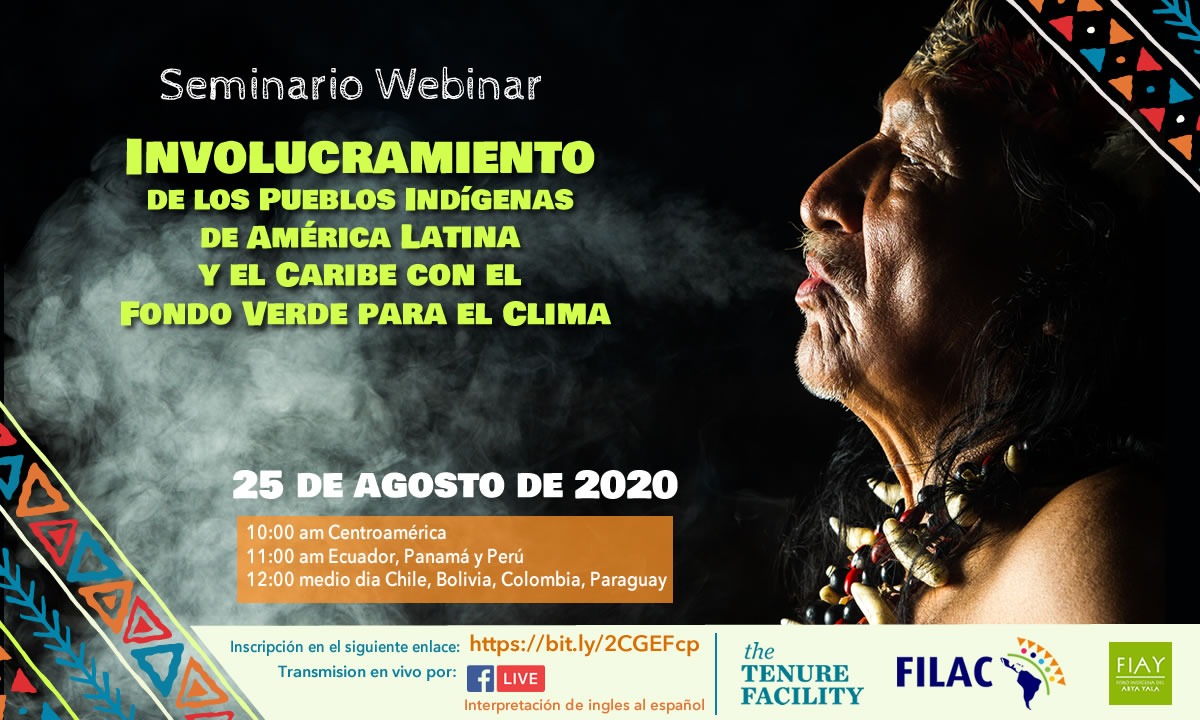
Organisers: FILAC and the Tenure Facility
When: Tuesday, August 25th, 10:00 – 11:30 am CST (18:00 – 19:30 pm CEST)
Where: Online. Register here.
The rights of Indigenous Peoples have been established internationally in The International Labour Organisation (ILO) Convention 169 and in the United Nations Declaration on the Rights of Indigenous Peoples (UNDRIP). Although these instruments recognize that Indigenous Peoples have made invaluable and critical contributions to climate change mitigation and adaptation, their traditional knowledge and rights remain today at risk.
The Conference of the Parties (COP) of the United Nations Framework Convention on Climate Change (UNFCCC) also recognizes the need to strengthen the practices and efforts of Indigenous Peoples related to addressing and responding to climate change. The COP has further requested that the Green Climate Fund (GCF) considers a recommendation “to improve its consideration of local, indigenous and traditional knowledge and practices and their integration into adaptation planning and practices, as well as procedures for monitoring, evaluation and reporting.”
After 25 years of UNFCCC sessions the opportunities for participation of Indigenous Peoples remain limited. There is urgent need to change to open more spaces for dialogue and collaboration that will encourage the full and active participation of Indigenous Peoples in the design, implementation and evaluation processes of projects, as established in the Indigenous Peoples Policy of the Green Climate Fund.
This webinar will focus on the ways in which climate finance is promoted in Latin America and the Caribbean and the participation of Indigenous Peoples in these regions.
The webinar aims to:
Panelists:
Mirna Cunningham Kain– President of the Center for the Autonomy and Development of Indigenous Peoples (CADPI), she is President of the Board of Directors of the Fund for the Development of Indigenous Peoples of Latin America and the Caribbean, as well as the Tenure Facility.
Mayté Gonzalez– Regional Advisor for Latin America of the GCF.
Jesús Amadeo Martínez Guzmán– Indigenous Lenca from El Salvador, Bachelor of Legal Sciences, studies of Industrial Engineering, diploma in Law of Indigenous Peoples at the University of Costa Rica. Director of the Fund for the Development of Indigenous Peoples of Latin America and the Caribbean (FILAC) and President of the FILAC Commission on Normativity and Human Rights.
Mauricio Mireles– Mexican, sociologist and anthropologist. Policy Officer for Indigenous Peoples and Social Inclusion.
Elvira Gutiérrez– Bolivian of Quechua origin, former FILAC scholarship holder, graduated from Carlos III University as an Expert in Indigenous Peoples.
Angela Sales– Indigenous to the Guaraní peoples, from Paraguay. Member of the Continental Council of the Guaraní Nation and of the Kuña Guarani Aty National Organisation. She currently works in the Social Policies Directorate of the Ministry of Social Development of Paraguay.
Juan Carlos Jintach – Active member of the Interprovincial Federation of Shuar Centers of Ecuador (Ficsh), Confederation of Amazonian Indigenous Nationalities (CONFENIAE), Confederation of Indigenous Nationalities of Ecuador (CONAIE), and the current technical advisor on Climate Change, Biodiversity and International Policies of the Cooperation of the Coordinator of the Indigenous Organisations of the Amazon Basin (COICA).
Demostenes Ariel González V.- Secretary General of the Kuna General Congress – Comarca Kuna Yala.
Hector Tuy – Indigenous of the Maya-Kaqchikel people – Member of the Indigenous Organisation for Development Planning (NALEB ’) and partner of the Association for Research and Social Studies (ASIES).
Eileen Mairena C.– Nicaraguan. Miskitu indigenous. Anthropologist, from the Universidad del Valle. She is part of the global advocacy team on climate finance and indigenous peoples of the ELATIA Network of Indigenous Organisations.